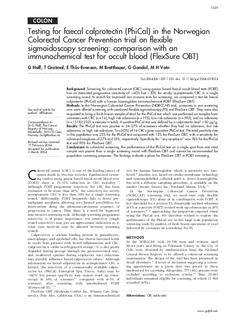| dc.description.abstract | BACKGROUND: Screening for colorectal cancer (CRC) using guaiac based faecal occult blood tests (FOBT) has an estimated programme sensitivity of >60% but <30% for strictly asymptomatic CRC in a single screening round. In search for improved non-invasive tests for screening, we compared a test for faecal calprotectin (PhiCal) with a human haemoglobin immunochemical FOBT (FlexSure OBT). METHODS: In the Norwegian Colorectal Cancer Prevention (NORCCAP) trial, screenees in one screening arm were offered screening with combined flexible sigmoidoscopy (FS) and FlexSure OBT. They were also requested to bring a fresh frozen sample of stool for the PhiCal test which was performed on samples from screenees with CRC (n = 16), high risk adenoma (n = 195), low risk adenoma (n = 592), and no adenoma (n = 1518) (2321 screenees in total). A positive PhiCal test was defined by a calprotectin level > or =50 microg/g. RESULTS: The PhiCal test was positive in 24-27% of screenees whether they had no adenoma, low risk adenoma, or high risk adenoma. Ten (63%) of 16 CRCs gave a positive PhiCal test. The total positivity rate in this population was 25% for the PhiCal test compared with 12% for FlexSure OBT, with a sensitivity for advanced neoplasia of 27% and 35%, respectively. Specificity for "any neoplasia" was 76% for the PhiCal test and 90% for FlexSure OBT. CONCLUSIONS: In colorectal screening, the performance of the PhiCal test on a single spot from one stool sample was poorer than a single screening round with FlexSure OBT and cannot be recommended for population screening purposes. The findings indicate a place for FlexSure OBT in FOBT screening. | |
